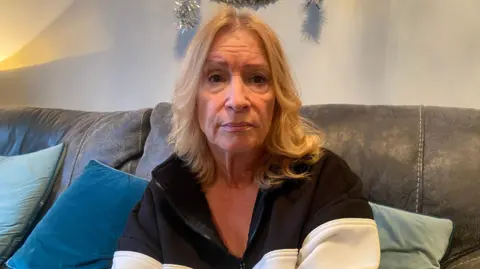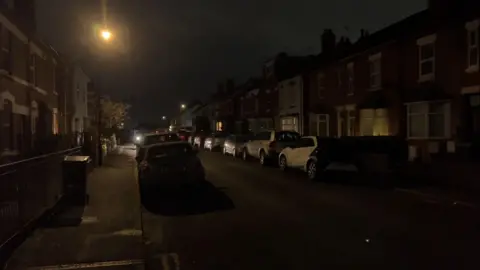Burglary fears in street light switch-off area
 BBC
BBCA spate of burglaries has been reported in an area of a city where the council is switching off street lights overnight to save money.
West Midlands Police is investigating reports of burglaries in Earlsdon, Coventry, in November.
The break-ins came after the city council switched off about 70% of street lights overnight to curb its electricity costs - some residents claim there is a connection.
The authority insisted there was no evidence to suggest the switch-offs have increased crime.
Residents said burglars stole cars and valuables from two houses and may have attempted to break into others in the month.
Police said enquiries were ongoing to find evidence and identify possible suspects.
The decision to switch off most street lights after midnight was expected to save the council £700,000, at a time when it is struggling to balance its budget.
The authority is proposing to make cuts of almost £14m next year to offset the rising cost of delivering public services.
In response to a Freedom of Information request, the council told the BBC it had saved almost £200,000 since introducing "part-night" street lighting in May .
It had received three formal complaints, however, and had turned some individual lights back on after carrying out assessments.
Security fears
People in Earlsdon believe there is a link between the burglaries and the street lights being turned off for a large chunk of the night.
Sue Rombach called the police to report an attempted break-in at her home last month.
She said it was so dark on her street after midnight "you can't see across the road".
"We've had more activity from West Midlands Police on this street in the last month than I've seen in a decade," Ms Rombach said.
"It's pitch black. It's intimidating. I've lived here for 30 years and always felt safe but not so much now."
Ms Rombach said the police have been proactive and, since the burglaries, she and other residents have installed extra security measures.
She urged the council to review and research the impact of their street lighting changes on crime levels.
Councillors have suggested the policy could be reviewed if they approve plans to borrow £10m to install more cost-effective LED lights in street lamps.

Mark Adams, the council's strategic lead for highway operations and delivery, said police were consulted before the move to part-night lighting and no concerns were raised.
He said police have recently talked to residents and found no evidence of an increase in crime since its introduction.
The council officer said crime might even be falling as it was more difficult for criminals to break into cars and homes in the dark.
"We're not resting on our laurels," he said.
"We do keep communicating with the police and with the community safety teams to ensure we're robust in what we're doing."
The College of Policing reviewed 13 studies and concluded there was evidence to suggest street lighting could cut crime.
But another study, by the London School of Hygiene & Tropical Medicine, found no evidence that reduced street lighting was linked to increased road crashes or crime.
It analysed night-time crime data in 62 council areas including half a million burglaries, said Dr Phil Edwards, one of the study's authors.
He said more research needed to be done as some studies had mixed up crime during the day and night.
A spokesperson for West Midlands Police said the force was investigating the burglaries in Earlsdon to find those behind them.
"We carry out regular analysis of emerging patterns and trends of crime across the West Midlands," they added.
"This all feeds into the planning of our patrol strategies and disruption work.
"We have a darker nights crime advice page on our website which shares advice and help on keeping your home and property safe during darker periods."
Follow BBC Coventry & Warwickshire on BBC Sounds, Facebook, X and Instagram.
